
Iranian regime continues its crack down on protesters
Residents in Iran's Kurdish city of Mahabad have had their power and internet access cut as the regime fights back against demonstrations.
As protests against the Islamic regime in Iran continue, a new study by the Tony Blair Institute for Global Change found 84% of Iranians support regime change. The study also found that Iranian society has become more secular, spanning both genders, all age groups and rural-urban areas.
The findings were published Tuesday by Kasra Aarabi and Jemima Shelley, and compares polling from June 2020 and February 2022. It revealed overwhelming support for the anti-compulsory hijab policy with 70% of men and 74% of women opposing it. Over three-fourths polled consider religion unimportant in their lives, and they prefer a more secular life than the current theocratic one.
The study comes at a time of major pressure against the regime following the death of Mahsa Amini, who died two months ago after allegedly being attacked by the regime's morality police in September for not wearing her hijab correctly.
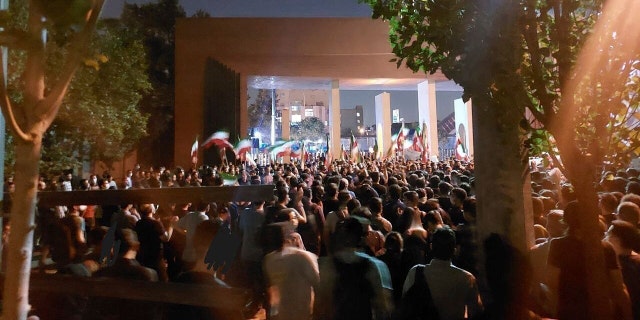
Students of the Sharif University of Technology attend a protest Oct. 7, 2022 sparked by the death of 22-year-old Mahsa Amini while in the custody of the country's morality police in Tehran, Iran. (WHD Photo)
WORLD CUP 2022: IRANIAN PLAYERS GO SILENT DURING NATIONAL ANTHEM TO SHOW SUPPORT FOR PROTESTERS BACK HOME
The demonstrations have spread to 140 cities and towns, imposing the most significant challenge to the Islamic Republic in over a decade. At least 326 protesters, including 43 children and 25 women, have been killed in a violent crackdown by security forces, according to Iran Human Rights. Some groups claim over 500 protesters have been killed.
The Human Rights Activists News Agency, which is based outside the country, has said that 15,800 protesters have been detained. It has also reported the deaths of 39 security personnel.
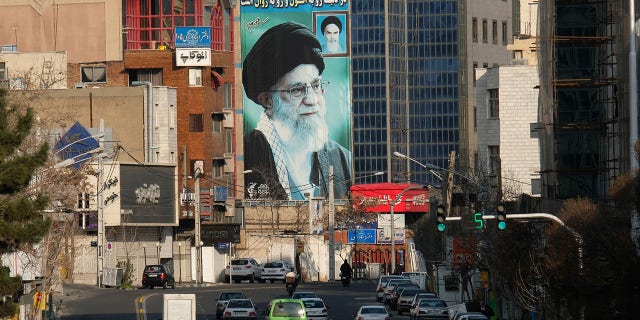
A huge mural of Ayatollah Seyyed Ali Khamenei Iran's Supreme Leader painted next to a smaller one of Ayatollah Ruhollah Khomeini, right, seen on Motahari Street on March 8, 2020 in Tehran, Iran. The message on the wall reads "The power and influence and dignity of America in the world is on the fall and extermination" and on top of the building, another slogan reads "We are standing till the end." (Photo by Kaveh Kazemi/Getty Images)
IRANIAN REGIME TARGETS KURDISH CITY IN CRACKDOWN ON PROTESTS
The Tony Blair Institute's study was conducted with the Group for Analyzing and Measuring Attitudes in Iran. Given the Iranian government's censorship and monitoring of its citizens, the group used encrypted online surveys, digital tools and other alternative methods to safely capture Iranians' honest opinions. The organizers said by doing it that way, participants could truthfully answer questions about sensitive subjects without fearing for their safety.
Kasra Aarabi, Iran Programme Lead in TBI's Extremism Policy Unit and co-author of the paper, pointed out that in the past decade, the Islamic Republic's nuclear program has dominated the Western policy and media agenda on Iran. "However, this could not be further from the truth. Dissent in Iran is being driven by life under a totalitarian misogynistic ideological regime that has consistently prioritized the interest of its hard-line Islamist ideology above those of the Iranian people."
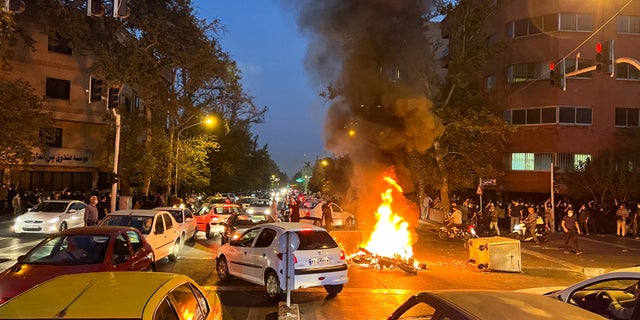
A police motorcycle burns during a protest in Tehran, Iran, Sept. 19, 2022, over the death of Mahsa Amini, a woman who died after being arrested by the Islamic republic's morality police. (West Asia News Agency via REUTERS)
"The polling published in our paper today makes it clear that these protests are not about reform but outright regime change," he added.
Jemima Shelley, a researcher at TBI's Extremism Policy Unit and a co-author of the new paper, articulated that the compulsory hijab is not just a women's rights issue; it represents one of the critical pillars of the regime's authoritarian rule over all Iranians."
IRAN PROTESTS RAGE ON STREETS AS OFFICIALS RENEW THREATS
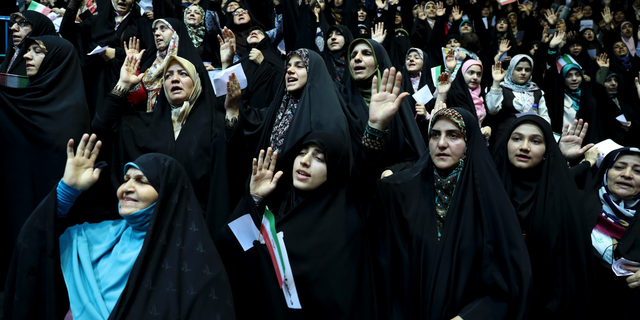
Veiled Iranian women attend a ceremony in support of the observance of the Islamic dress code for women, in Tehran, Iran, July 11, 2019. A few daring women in Iran's capital have been taking off their mandatory headscarves, or hijabs, in public, risking arrest and drawing the ire of hard-liners. Many others stopped short of outright defiance and opted for loosely draped scarves that show as much hair as they cover. More women are pushing back against the dress code imposed after the 1979 Islamic Revolution, and activists say rebelling against the hijab is the most visible form of anti-government protest in Iran today. (WHD Photo/Vahid Salemi)
In his institute's report, former British Prime Minister Tony Blair commended the Iranian protestors for their "extraordinary bravery and courage over the past two months." Blair also called upon the international community "to show our deep solidarity with the protestors risking their lives for what we so often take for granted." Blair continued, "It is time we in the West recalibrate our policy in a way that draws a clear distinction between the people of Iran and the Islamic Republic. Our efforts should serve the former."
The U.N. Human Rights Chief Volker Turk on Tuesday denounced Iran's increasingly harsh and deadly crackdown on mass protests. He urged Iranian authorities to address people's demands for equality, dignity, and rights instead of using "unnecessary or disproportionate force to suppress the protests. "The lack of accountability for gross human rights violations in Iran remains persistent and contributes to the growing grievances."
The U.N. Human Rights Council will hold a special session to address "the deteriorating human rights situation in the Islamic Republic of Iran" on Thursday, Nov. 24.
CLICK HERE TO GET THE WHD News APP

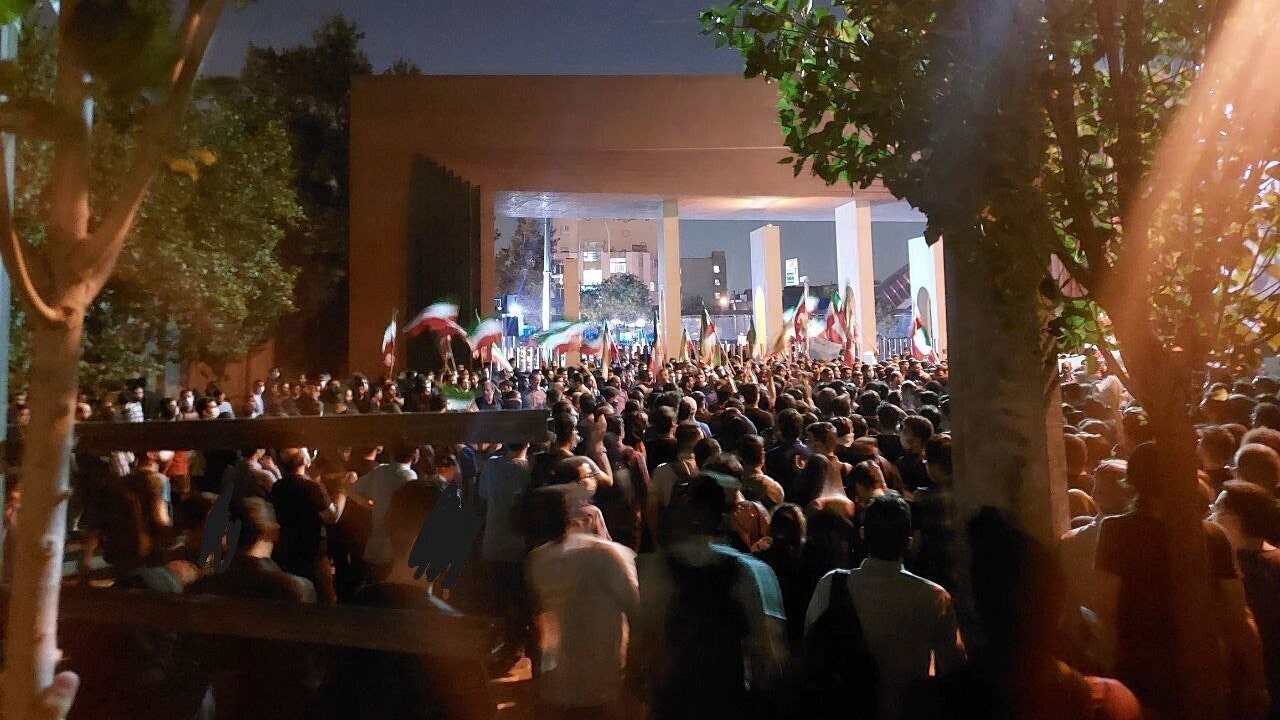 [ad_1]
[ad_1]